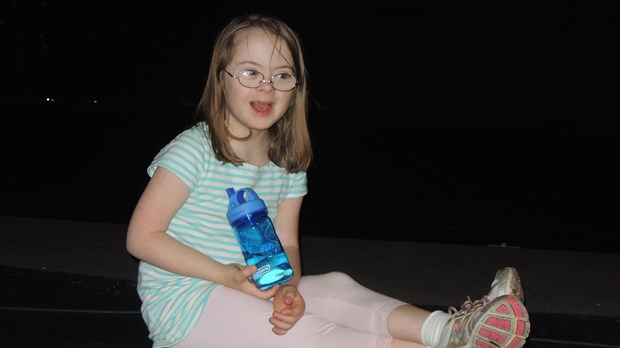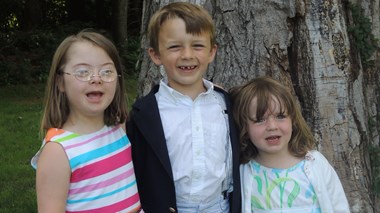
My husband Peter and I were walking on the beach the other day. Even though she was far away, with her back to us and her body halfway submerged in water, we knew. She turned around and her face assured us. She had Down syndrome, just like our daughter Penny. We were away from our kids for a few days, and just seeing this little girl in the water with her dad—with her big smile and her determination to learn how to surf—provoked a visceral reaction within my chest. It wasn't just that she reminded me of Penny, but also that I felt connected to her and to her parents, to the people surrounding her who clearly saw her as one who belonged, who should be running into the water in a wetsuit just like every other kid in their group. We stood on the beach and watched for a while, filled with a sense of gratitude and wonder and connection.
That's my story about Down syndrome. Gratitude and wonder and connection. I don't mean to downplay the harder aspects of Penny's existence or of our experience as her parents. But I also don't think her life demands any caveats. She's an 8-year old big sister who is learning how to play tennis and (albeit reluctantly) ride her bike, who has spent some part of every day this past week reading the page proofs of my new book (not a book for children, by the way, but a book that contains stories about Penny and her siblings and thus has provoked endless curiosity and a host of new vocabulary words), who walks next door to her great-grandmother's house nearly every afternoon for a visit, who loves flip flops and swimming pools and monkey bars. Who pleads with us to go to church on Sundays because of how much she loves the worship music.
Gratitude and wonder.
It is precisely because of both the gratitude and the wonder that I share the concern of many of my friends and colleagues, fellow parents who want accurate information to reign in both the medical and cultural narratives about Down syndrome within our society. We span the pro-life and pro-choice spectrum, from ardent conservatives to vehement liberals, but we agree that we want up-to-date, accurate information presented to the public, and especially to women receiving a prenatal diagnosis of Down syndrome.
It might seem odd to center a blog post around the idea that information should be up-to-date and accurate, and yet the information surrounding Down syndrome within both the medical community and the public at large—for people on both the pro-life and the pro-choice side of the abortion debate—is often outdated or just plain false.
I'm not going to detail the problems with information within the medical establishment here and now, though I will take the time to express my excitement that Pennsylvania has joined five other states in passing laws to ensure greater accuracy in the way doctors present information around Down syndrome and other prenatally identified conditions. (See Mark Leach's blog post about this law for more information.)

My concern for today is the false cultural narrative that skews our perceptions of children and adults with Down syndrome. Take, for instance, the oft-repeated claim that 90% of all babies conceived with Down syndrome are aborted. This number has been used by pro-life activists in an attempt to provoke an outcry on behalf of these children. But two problems arise. One, the information is just not true. I've written at greater length about this in the past, but suffice it to say that the number is based upon outdated studies that themselves were based on women who had elected to have an amniocentesis to check for Down syndrome. To the best of our knowledge, around 50% of babies with Down syndrome make it from conception to birth (excluding miscarriage). For women who opt for prenatal testing, the abortion rate is closer to 75%. These numbers still give cause for alarm among pro-life activists and among advocates for the great potential for good lives for children with Down syndrome and their families. And yet the 90% number is patently untrue.
The second problem, as Maureen Wallace has most recently argued, is that even if the 90% were true (which, I repeat, it is not), it doesn't help the cause of helping families believe a good life is possible with Down syndrome. As Wallace writes:
If you have a choice and you're told more than 90 percent of people choose A over B, are you more likely to choose A? Do you wonder what's wrong with B? Do you think, "My God, I had no idea B was such an unwanted choice!"
Pro-life people who want to advocate for life with a child with Down syndrome need to abandon the lie that 90% of them are aborted before they are born. Instead, they need to focus upon the legislative and social efforts to provide accurate information to doctors and families about Down syndrome, and they need to help tell the good stories of life with Down syndrome. Beyond that, they need to work towards an ethos of friendship, care and support that communicates the value of these children's lives from conception to birth to childhood to adulthood to death.

There is plenty of work to be done on behalf of people with Down syndrome, whether in the realm of prenatal counseling or early intervention or providing meaningful employment or funding research about the condition.
Let's start with telling the truth about prenatal testing, and, perhaps more importantly, with testifying to the truth of the good lives countless families have experienced with a sibling or child with Down syndrome among them. Let's start with accurate information, and hope and pray that it leads, one day, to gratitude and wonder.
Support our work. Subscribe to CT and get one year free.
Recent Posts

Are 90 Percent of Babies Diagnosed with Down Syndrome Really Aborted?
Are 90 Percent of Babies Diagnosed with Down Syndrome Really Aborted?
Are 90 Percent of Babies Diagnosed with Down Syndrome Really Aborted?
Are 90 Percent of Babies Diagnosed with Down Syndrome Really Aborted?
















